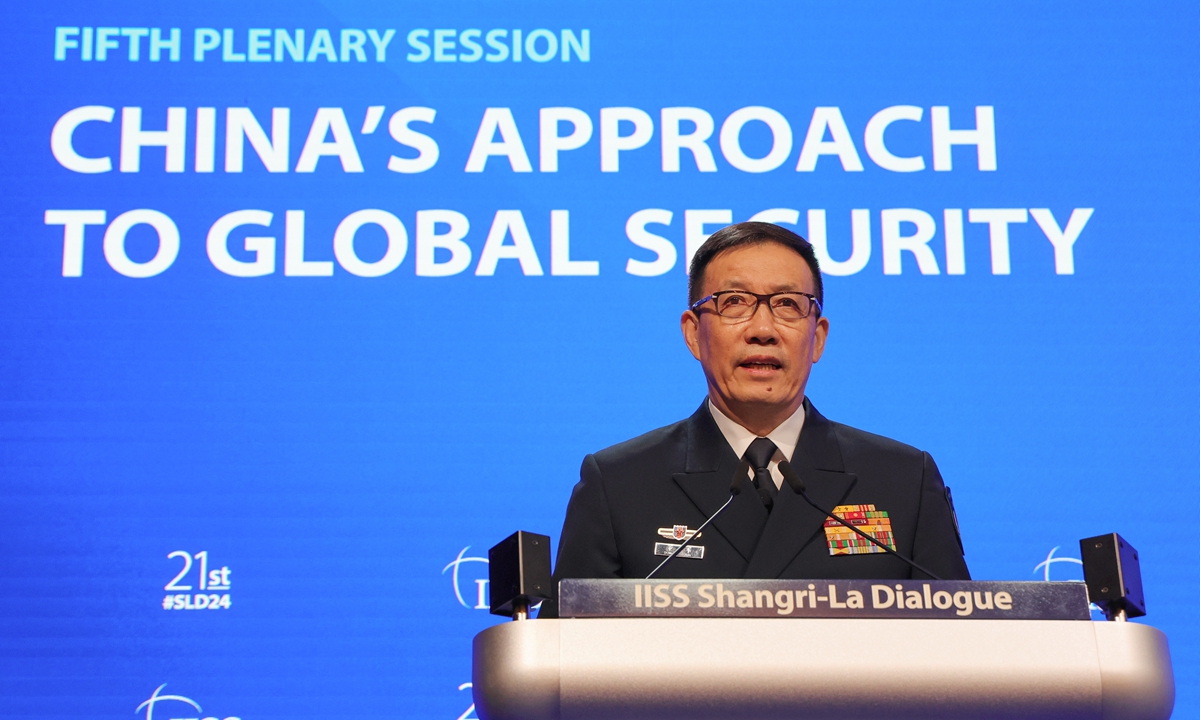
Chinese Defense Minister Dong Jun delivers a speech at the 21st Shangri-La Dialogue in Singapore on June 2, 2024. Photo: VCG
Chinese Defense Minister Dong Jun on Sunday introduced China's approach to global security on the closing day of the Shangri-La Dialogue in Singapore, as he offered Chinese thoughts on resolving global security issues with a global perspective, while reiterating China's firm stances on the Taiwan question and the South China Sea issue.In his speech at a plenary session at the Shangri-La Dialogue on Sunday, Dong said that China's vision of building a community with a shared future for mankind, together with the Global Development Initiative, the Global Security Initiative and the Global Civilization Initiative, echoes the trend of history and responds to the longing of people around the world for a better life.
The Chinese military stands ready to work with other counterparts to deepen security cooperation and make more contributions to safeguard lasting peace and common prosperity in the Asia-Pacific as well as the world, said the Chinese Defense Minister.
"People in the Asia Pacific are committed to harmony and peace, are independent and self-reliant, and always support each other through thick and thin. We will not allow hegemonism and power politics to undermine the interests of Asia Pacific countries. We will not allow anyone to bring geopolitical conflicts or wars whether hot or cold, into our region. We will not allow any country or any force to create conflict and chaos in our region," he said.
The Chinese side is willing to work with all parties to protect the legitimate security interests of all countries, build a more just and reasonable international order, give full play to regional security architecture, advance open and pragmatic defense cooperation, set an example of maritime security cooperation, strengthen security governance in emerging areas, create a new situation of regional security cooperation, and continue to make the Asia Pacific an anchor for global development and stability, Dong said.
Zhang Chi, an associate professor at the National Defense University of the Chinese People's Liberation Army (PLA), told the Global Times on the sidelines of the Shangri-La Dialogue on Sunday that Dong's speech was pitched at an overarching global perspective, ranging from history to reality, from Asia to the world, and explained how China as always stands ready to pursue common security and common prosperity with all other countries, offered Chinese thinking and elaborated on Chinese efforts to tackle the current regional security issues.
Compared with the speech delivered by US Secretary of Defense Lloyd Austin on Saturday, Dong's speech stood at regional and global heights focusing on the entirety of humanity, Zhang said, noting that Austin focused mainly on the US and its allies and partners in the region, revolved only around its own egoistic and selfish interests, and ignored the centrality of ASEAN in regional cooperation.
The core of Austin's speech is that the US aims to achieve leadership in the "Indo-Pacific" region through initiatives such as AUKUS, the Quad and other military alliances, while also subtly hinting at the creation of an "Indo-Pacific version of NATO," which is a flawed strategic understanding and misguided perception of security that experts said engenders turmoil, conflict and even war, instead of fostering security and stability.
Given the ongoing conflicts in Europe and the Middle East, the Asia Pacific is one of the few regions in the world that still enjoys stability today. It is clear which global security approach, China's or the US', fits more the core interests and legitimate security concerns of the most countries, observers said.
China values peace and harmony, pursues common security, upholds equality and mutual respect, and emphasizes openness and inclusiveness, but it also firmly safeguards its core interests, Dong said in his speech.
On the South China Sea issue, Dong said that the current situation in the South China Sea is generally stable. He urged a certain country to see where its true interests lie, and return to the right track of dialogue and consultation.
China has exercised enough restraint in the face of infringements and provocations, but there is a limit, Dong warned, without naming the Philippines, which has frequently trespassed into waters off Chinese islands and reefs in the South China Sea since August 2023 under the instigation of the US. It has seen its provocations dealt with by the China Coast Guard (CCG) through legitimate, professional and restrained restrictive measures.
On the Taiwan question, Dong stressed that safeguarding China's national sovereignty and territorial integrity is the sacred mission of the Chinese military. "We will take timely and resolute actions to stop 'Taiwan independence,' and make sure their attempts never succeed," he said.
Lieutenant General He Lei, former vice president of the Academy of Military Sciences of the PLA, told the Global Times on the sidelines of the Shangri-La Dialogue on Sunday that China's approach to global security also covers the South China Sea and the Taiwan Straits.
China remains committed to peaceful reunification, but under the instigation of external interfering forces, the Taiwan authorities are now unilaterally changing the status quo on the one-China principle, which is the biggest threat to peace and security in the Taiwan Straits, bringing risks of conflict and war, He Lei said, urging the "Taiwan independence" secessionist forces to learn from Dong's elaboration on China's approach to global security, see itself as a part of a community with a shared future, and reunify with the motherland as soon as possible.
The same applies for the South China Sea disputes, as countries should resolve disputes through peaceful talks and negotiations and safeguard the security in the region through joint efforts, said He Lei.
Changes needed
When answering a question and introducing China's stance on the Taiwan question, Dong was interrupted by the moderator, but he insisted on finishing his elaboration.
The experts noted that the Shangri-La Dialogue this year had a fierce "crossfire" of stances, starting by the arrangement that the keynote speech was delivered by Philippine President Ferdinand Marcos Jr on Friday.
Participants said that the forum was staged to suppress and smear China, particularly this year.
Cao Yanzhong, a research fellow at the Academy of Military Sciences of the PLA, told the Global Times that the International Institute for Strategic Studies (IISS), the organizer of the Shangri-La Dialogue, is a research institute serving British and US strategies, and all of its operation is backed by the US.
According to the IISS' website, the sponsors of the Shangri-La Dialogue include some of the US' top arms dealers, including Lockheed Martin, Boeing and Northrop Grumman.
Warwick Powell, adjunct professor at the Queensland University of Technology, told the Global Times at the forum that the Shangri-La Dialogue is a creature of history, as it emerged in a time when the countries of the Global South were voiceless, and questions of security, even in the Asia region and the Asia-Pacific more broadly, bore the marks of centuries of colonialism. Security in Asia was a question for colonial powers to come and talk about how they would maintain security in a region far from their own homes and how they would teach the locals about security.
"However, the world has changed, and I hope the Shangri-La Dialogue will respond to these changes and evolve accordingly," said Powell.






